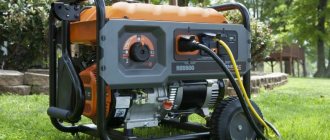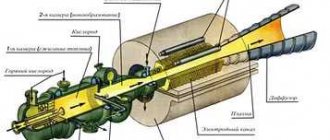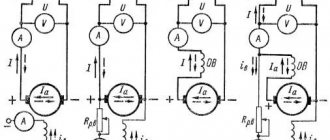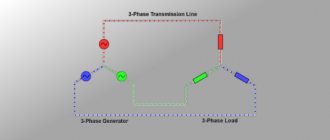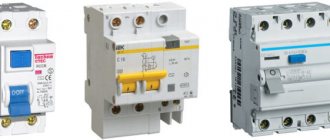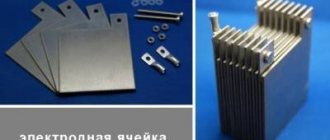Kitchen appliances, pumping stations, heating systems and many other household appliances require uninterrupted power supply. In the event of a power outage, only a special gasoline electric current generator for a private home can help. Let's look at what this device is, what parts it consists of and how it works, what types of it can be bought today, what criteria should be used to make a choice, as well as how to correctly calculate the power and what stages the procedure for starting it consists of.
Generator for a private home Source optoweek.com.ua
When is a home generator useful?
Electric generators are most often used in emergency situations. When the power supply to the site is interrupted, it is enough to remove this unit from the garage and start it to temporarily restore the power supply.
Many people consider such a device to be an unnecessary luxury. However, in populated areas where the power supply is often interrupted or during an emergency, a generator can help out.
Gasoline generators
Compactness, affordable cost and simplicity are the advantages of this type. Gasoline generators are used in everyday life when there are temporary problems with electrical networks. They power lighting, household electrical appliances, and are used to charge car batteries. For power supply (as a rule) AI-92 gasoline is used.
Such models are not suitable for constant power supply to a home due to lower reliability and the amount of fuel consumed. Their scope is power supply to households during short-term outages.
Principle of operation
An electric generator is a device for generating electricity. It can be used to power electrical devices.
- An electric generator can power devices in a private home during a power outage.
- However, it can also be successfully used where it will be an independent source of electricity.
- Such places would be, for example, a garage, workshop, garden or construction site.
Diesel generators
An excellent solution for constant power supply not only to private homes, but also to industrial premises. Diesel generators are reliable, powerful and durable.
The cost of such models is noticeably higher than gasoline versions, their maintenance is more expensive (fuel costs are higher, oil changes are required more often). This is partly compensated by lower fuel consumption and long service life.
Diesel is not suitable for regions with extreme climatic conditions due to possible problems with fuel equipment and difficult starting in cold weather.
Example: Champion DG15ES diesel generator
Fuel type
The generator sets available in the market are most often equipped with an internal combustion engine. Some models can also run on liquefied or natural gas.
A petrol engine, like a car, may perform slightly better, but is theoretically less durable if the unit is used intensively.
When choosing a generator, you should also pay attention to the capacity of the fuel tank. It is related to working hours. It is also worth checking whether the generator has a fuel level sensor and a catalytic converter to reduce exhaust emissions.
How does it work
The engine chambers contain compressed fuel that can ignite. During the combustion process, gases are formed that begin to rotate the crankshaft. Because of this, the alternator rotor begins to work. A magnetic field is generated in the stator.
Electric generator
The result of the processes described earlier is the appearance of an inductive electric current in the winding. It is available for consumption immediately at the device output by any other devices. Trips to nature, backup power supply - situations when such solutions become relevant. In this case, an electric generator is indispensable.
Generators with internal combustion engines
The most commonly used generators are powered by gasoline or diesel internal combustion engines.
The power of the unit depends on the engine size. It is better to choose a place for them where the engine noise will not bother you. It is desirable that it have a roof.
Engine characteristics
Generator internal combustion engines are divided into two types:
- Diesel. Long service life, higher reliability (with timely maintenance and good fuel quality). They are distinguished by fuel efficiency at an initially higher cost of the generator. Suitable for constant power supply to homes and industrial premises. They do not like severe frosts - starting in such conditions is difficult; they require placement in insulated rooms with exhaust vented outside;
- Gasoline. A working generator starts at any temperature, which is why gas generators are suitable for all regions. Much cheaper than diesel ones, but not suitable for constant power supply.
ICE-type gasoline generators are divided into two more types: two- and four-stroke (diesel models are four-stroke only). Their features:
- Two-stroke varieties are suitable only for short-term use. Used when traveling outdoors or for occasional welding work. The period of continuous operation is no more than an hour. Operation to failure - about 500 hours;
- Four-stroke models are more powerful and more economical. Non-stop operation up to 8 hours in a row is allowed. The average service life before failure is about 2000 operating hours.
Single and three phase units
Single-phase generators require a voltage of 1~230V. These are low power devices. They are primarily suitable for household appliances. In turn, three-phase generators 3~400V are suitable for high-power equipment. These are mainly electric heating, hydrophore installations, water heaters, and so on.
- Before choosing a generator, it is also good to check what type of electricity the power comes from.
- There is also a more universal device - a three-phase generator, which also allows you to connect single-phase devices (it has 2 sets of sockets).
- However, such a unit should be used according to certain rules. The current power consumed from single-phase sockets cannot exceed 60% of the power of the entire generator.
- You should also ensure that when simultaneously supplying single-phase and three-phase loads, the phases are loaded more or less evenly.
The more powerful the generator, the more appliances you can power from it at the same time, but also the more money and space you will have to spend on it. Some models are very large. This is especially noticeable in the photo of a generator for the home.
Ensuring security requirements
Generators are usually installed outside closed areas. The main thing is that they are located where complete protection from precipitation and other environmental influences is guaranteed. The toxicity of exhaust products is the main reason why generators are prohibited from operating in enclosed spaces.
Note! A solid, stationary horizontal surface without elevations is the optimal support for installation. During installation, you must ensure that there is a free space of at least 1 square meter. This distance should remain on each side of the generator. This is necessary to organize free air circulation and eliminate heat transfer from the generator to surrounding objects.
There should be no foreign objects on the side of the outlet. They can damage the structure or become a source of additional danger to it. The ventilation openings should also be free of any contamination.
Children and other unauthorized persons must not have access to the generator. The same applies to other people who are not familiar with the principle of safe operation.
Self-repair of generators is prohibited; for this you need to invite specialists.
Finding sources of flame or smoldering combustion near the unit is unacceptable. Otherwise, it will not be possible to convert energy safely.
Compact devices
Generator types
A home generator produces power in a single-phase system, but three-phase generators can also be found.
Another criterion is the type of fuel used and the power generated by the device. The cheapest units are those with a two-stroke engine running on a mixture of gasoline and oil in certain proportions. Unfortunately, they are not very economical and are quite loud.
The best choice is a generator with a four-stroke internal combustion engine.
The least common devices on the market are natural gas generators.
- Their main advantage is that they can be powered from gas cylinders, so they are often used as an emergency power source on sites.
- Unfortunately, the gas itself is ineffective and burns strongly while the device is operating.
- However, if you need a very efficient generator that will be used frequently, you may want to look at a diesel generator.
Types of launch
Units can be started in several ways:
- starting with a manual starter;
- starting from the key - with a starter from the battery;
- combined launch;
- automatic start from voltage control systems.
The smallest units are equipped with manual start; larger machines have electric start. In addition to an electric starter, such systems are equipped with a rechargeable battery, which, of course, further complicates the design.
Figure 8. Patriot starter battery.
Generators designed to provide power backup are equipped with special input circuits to automatically start when the main power supply disappears. To implement this mode, specialized systems for automatic switching of generators have been created.
An example is the GPA-1005 automatic transfer installation, which performs the following functions:
- monitoring the presence of voltage in the network;
- sending a signal to start the generator when the main power supply disappears;
- switching load power circuits to power from the generator;
- switching the load to the network when the main power is restored;
- shutdown of the backup generator.
Fig. 9. Autorun unit GPA-1005.
Generators compatible with autostart devices can also be started using the starter key.
Number of connected devices
In order for the energy generator to fulfill its task, its power must be greater than the total power of the devices that will be connected to it.
Rated (not maximum) power is important, especially when it is necessary to power devices with asynchronous motors that require high current, such as pumps or hydrophores.
- When determining the power of an electric generator for a home, you should add up the power of all the devices that you plan to power.
- It should be 70-80% of the generator power. However, this indicator may vary depending on the generator itself and the connected devices.
- It is worth studying this topic in more detail before purchasing.
- Typically, 1.2 kW is added to the power consumption of each device. The power reserve should be 20-30%.
- Otherwise, the power consumption may be too high and you will have to turn off several devices.
It is better not to connect single-phase and three-phase devices to a three-phase generator at the same time.
Also, if necessary, you can buy a generator for your home with automatic start.
Rating of the TOP 15 best models
| Place | Name | Price |
| TOP 5 best gasoline generators with auto start | ||
| 1 | Hyundai HHY 7020FE ATS | 45 000 ₽ |
| 2 | Huter DY8000LXA | 53 000 ₽ |
| 3 | BISON ZESB-6200-EA | 52 000 ₽ |
| 4 | Huter DY6500LXA | 42 000 ₽ |
| 5 | Daewoo Power Products GDA 8500E-3 | 60 000 ₽ |
| TOP 5 best gasoline generators with manual start | ||
| 1 | PATRIOT GP 2000i | 22 000 ₽ |
| 2 | BISON ZIG-3500 | 37 000 ₽ |
| 3 | Fubag Ti 2300 | 37 000 ₽ |
| 4 | CHAMPION IGG950 | 7 000 ₽ |
| 5 | Denxel GT-950i | 18 000 ₽ |
| TOP 5 best inverter gasoline generators | ||
| 1 | Huter DY6500L | 29 000 ₽ |
| 2 | Hyundai HHY 3020FE | 22 000 ₽ |
| 3 | CHAMPION GG6500 | 25 000 ₽ |
| 4 | Kolner KGEG 3000M | 11 000 ₽ |
| 5 | Hyuindai HHY 10000FE | 48 000 ₽ |
The quieter the better
Which generator is best for home? There is no clear answer to this question. But another important parameter when choosing a device is the level of noise it creates, which is indicated in the specification.
If the generator is located outside the building, then the volume can still be tolerated.
- The situation is different, for example, in a garage. Unfortunately, most generators available on the market make a lot of noise, reaching levels of 90-98 dB during operation.
- For comparison, a passing motorcycle produces 95 dB.
- However, there are models of built-in units (unfortunately, correspondingly more expensive), in which the noise level is reduced to 65–75 dB (vacuum cleaner - 70 dB).
Additional functionality
Additional functions increase the comfort and safety of generator operation. They are presented:
- overload protection, which prevents short circuit conditions that threaten the integrity of the power source and consumer devices;
- a stabilizer that protects electrical appliances that are sensitive to voltage surges;
- wheels to facilitate transportation of the unit;
- sound insulation that reduces engine sounds;
- a voltmeter, ammeter, counter, allowing you to monitor the operation of the electrical installation.
Some devices can be retrofitted with a larger fuel capacity, which increases the operating time without the need for refueling.
Photo of a generator for home
Share with friends
Popular manufacturers
Choosing a brand of equipment is one of the most important tasks. Among the most popular are
- Honda , which is distinguished by high and stable production quality, as well as the ability to select equipment for difficult working conditions, low noise levels, easy starting, good traction and power performance.
- Kipor is one of the highly reliable Chinese brands with a large range of gasoline and diesel units, which is in demand due to its relatively low cost and is perfect for use at home or in the country.
- Huter is a brand that appeared on the Russian market relatively recently and is distinguished by its low cost, reliability and stability, and a wide range of models, including gas units.
- Zubr is a Belarusian brand that is on par with the world's leading brands at an optimal price level.
Hyundai , SDMO , Wilson , DDE and FUBAG are also widely represented on the market . It is also worth paying attention when choosing a specific model and manufacturer to the availability of a developed network of technical service centers for this equipment in order to protect yourself from lengthy searches for the necessary specialists and spare parts.
